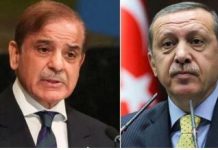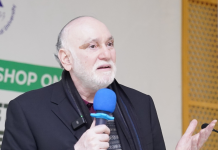ISLAMABAD, Dec 07 (DNA): Pakistani Foreign Ministry Director General Arms Control and Disarmament Kamran Akhtar said on Saturday that all parties of the Iranian nuclear deal, JCPOA, should abide by their obligations whether it is one party or the other.
Kamran Akhtar made the remarks in a conference on Peaceful Uses of Nuclear Technology.
Responding to a question of IRNA at the conference said the JCPOA is a model on how very difficult issues can be resolved through negotiations and peaceful means.
The conference was organized by the Strategic Vision Institute (SVI) at Pakistan Institute for Parliamentary Studies (PIPS) in Islamabad.
Kamran Akhtar expressing his views said Pakistan has always maintained that the JCPOA was a good agreement and it was a model on how very difficult issues can be resolved through negotiations and peaceful means.
“We continue to support that all parties to agreement should abide by their obligations whether it is one party or the other, they should abide by their obligations,” he noted. ‘We hope that the parties will be able to find an amicable solution to their problems and keep the agreement intact rather than going the other way.’
Kamran Akhtar, earlier in his presentation, called for changing the narrative about Pakistan’s nuclear program from that of deterrence to one for peaceful uses.
He said that the civilian program constituted a major part of the nuclear program and as such needed to be highlighted. Whether it’s in energy, medicine, or agriculture sectors, or for dealing with climate change, the civilian program, he said, is contributing to the welfare of people and towards the attainment of sustainable development goals.
Zamir Akram who has served as Pakistan’s ambassador to the United Nations in Geneva and Conference on Disarmament, in his speech said Pakistan can consider accepting additional non-proliferation obligations, which are demanded by Western countries, only if there is an appropriate quid pro quo.
He talked about the discriminatory attitude of the West towards Pakistan on giving it access to civil nuclear cooperation. “We continue to be asked to demonstrate that we are a responsible and reliable nuclear state,” he said.
“We need not compromise on our nuclear program, whether it is civilian or military, in order to get a certificate that we are a responsible nuclear state,” he maintained.
Akram said that there has been an excessive focus on military part of ‘‘our nuclear program and it is time that the spotlight be shifted to the civilian part’’.
Former defense production secretary retired Lt Gen Syed Mohammad Owais, who was the chief guest at the inaugural session, while praising the progress made by the country towards using nuclear technology for peaceful purposes, said it was a matter of national pride, which also testified to the country’s “unhindered focus, commitment and tenacity in achieving self-sufficiency”.
SVI president Dr Zafar Iqbal Cheema, in his remarks, said Pakistan has been an active player in the global nuclear order promoting non-proliferation, arms control and disarmament.
Dr Cheema observed that Pakistan’s elaborate program for harnessing peaceful uses of nuclear energy includes power plants, research reactors, agriculture and biotechnology research centers, medical centers, and industrial applications. He said that a strong civil program was essential for advancing economic development plans.
He also mentioned Pakistan’s strong credentials with respect to IAEA safeguards implementation at its facilities, the presence of a robust regulatory mechanism and a commitment to pursuing and expanding its civilian program. DNA
================
















